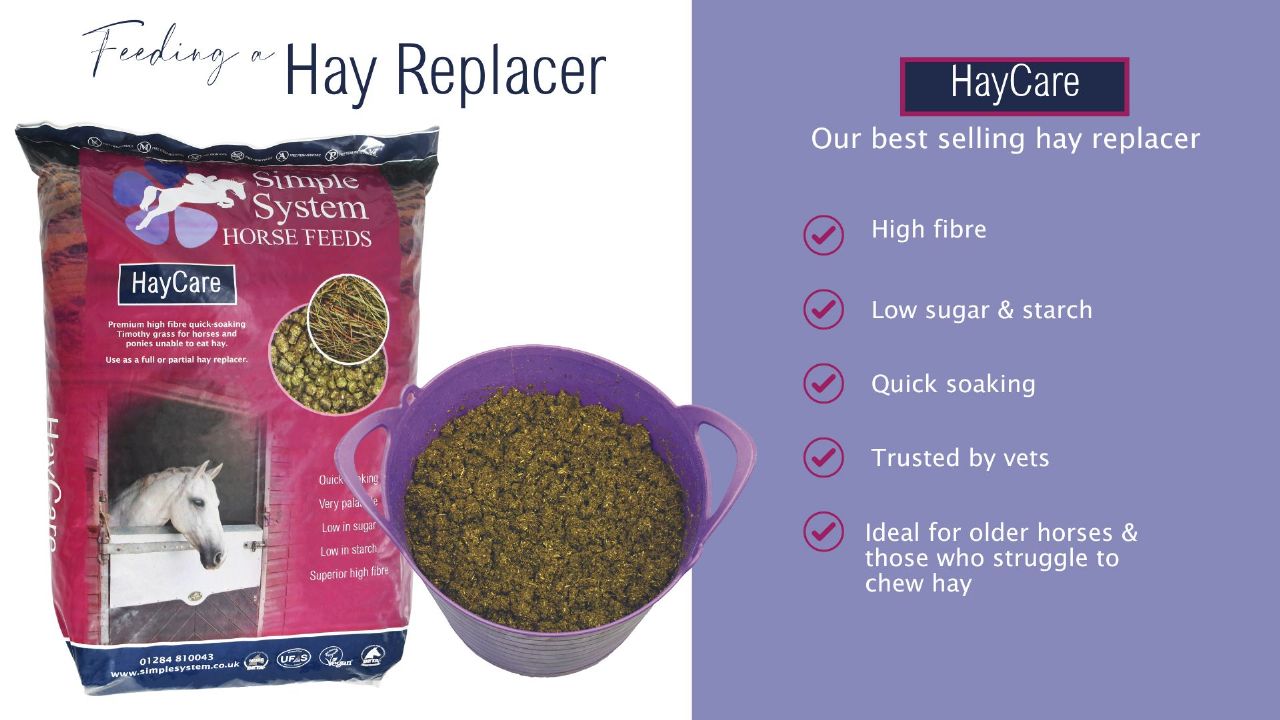Why do we recommend feeding horses from ground level?
How does the horse's jaw work? What happens if horses eat above ground level? Read the article to learn more...

With both grass and hay in short supply in some areas, a lot of horse owners are looking for a suitable forage to replace hay & keep the horses ticking over until there is more grass and new hay.
Cheap feeds are not always economical, good quality always pays.
On our travels we have seen some hay and haylage made already which is encouraging, but it is best to wait at least 6 weeks before using it and bear in mind, when made in May or June, this could be very rich. It will be high in sugar and protein but relatively low in fibre, so not quite what we normally think of as hay. Ideal horse hay is first cut, made in July or even August, when fibre levels are higher and it is not too nutritious or heating.
So, until the next lot of suitable hay is around what are the alternatives?
HayCare is the obvious choice for many horses. It is a hay replacer that offers nutrition levels close to that of high fibre, low sugar hay. HayCare is also fed in the same dry weight quantities as hay, so if you would substitute a 5kg haynet with 5kg of HayCare (dry weight before soaking). Use 2.5 parts of water for each part HayCare. Most horses prefer their hay replacer as a mash but some do prefer a wetter feed, in which case add extra water - 3 parts water to 1 part hay replacer.
Soaked Blue Bag Grass Pellets are a great grazing replacer. They are nutritious, but not too nutritious, are a nice chew and being soaked, are hydrated just like fresh summer grazing. You can feed lots too. An average horse can have up to 5kg per day and that's the dry weight before you soak them! For each part of Blue Bag Grass Pellets use 2.5 parts of water. It soaks up in a few hours.
Soaked PuraBeet - our unmolassed beet pulp pellets - are a very economical option. We hesitate to say it is cheap horse feed, but it is hard to beat on price! PuraBeet goes a long way as it makes up to 5 times its original volume. It is safe to feed in considerable amounts - an average horse can have up to 2.5 kg dry weight before soaking. In the warmer weather you will find this takes only a few hours to soak up. It is safe to feed when there are no lumps left.
If soaking leaves you cold, then you can use chops as grazing or hay replacer! LucieChop is a good one for horses with higher nutritional needs, and Organic Lucie Stalks for those watching their waistlines. If it is grass you are after, Timothy Chop is a high fibre totally pure grass chop. As we do not use any soya, oil or molasses, you may prefer to dampen these a little at feed time. An average horse can safely eat up to 5kg of either of these a day.
Lucie Brix are really good for horses with a low boredom threshold as they love gnawing on them. They are 1kg forage blocks of compressed lucerne. Ideal for racehorses, competition horses and any horse with reasonable nutritional needs. Each Lucie Brix will replace approximately one slice of hay.
Soaked forage pellets are ideal for those whose teeth cannot cope with chewing longer fibre. Veteran horses, youngstock undergoing dental changes and those recovering from surgery or dental work my all struggle to chew. HayCare is our customers number one choice for such horses, it is also frequently recommended by vets. If your horse or pony is sensitive to grass, you can use low calorie Lucie Fibre Cubes for those good doers or Lucie Nuts for those with higher requirements. iif grass has the thumbs up and you don't have HayCare to hand, Blue Bag Grass Pellets take some beating! Mix them with soaked PuraBeetfor an economical, cost-effective hay replacer.
You may find that some of these alternative feeds offer such nutrition you do not need so much of your usual manger feed, but do not forget to use a dedicated forage balancer such as Total Eclipse or if your equine pal has any form of Equine Metabolic Syndrome or is prone to laminitis use MetaSlim. For poor doers that need to gain weight TopGain is very easy and palatable and is a comprehensive feed in itself and you do not need very much -500g per day for an average (500kg) horse. If you are feeling the pinch, the cheapest way of providing a natural balancer is Pure Ocean Seaweed and you only need 50g per day! In warm weather especially, your horse will need more salt and should have free access to a plain white salt lick such as our Salt Lick Tub. Economical, convenient, a free feed skip when it is used, low food miles as the salt is from Cheshire, not America or Asia - what more could one ask for?
If you'd like to discuss your horse's diet our team of Feed Line nutrition experts are happy to help. Call 01728 604 008 or complete our online form for a free feed plan.
How does the horse's jaw work? What happens if horses eat above ground level? Read the article to learn more...
We're thrilled to be adding an exiting new event to the calendar for 2026!
Horses’ teeth change throughout their lives - they are continually growing and continually wearing, as they chew and grind their grazing and forage.